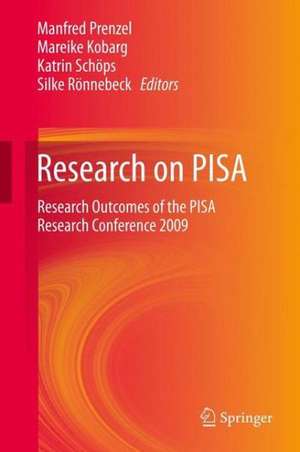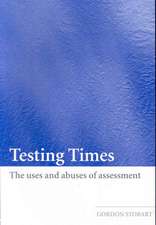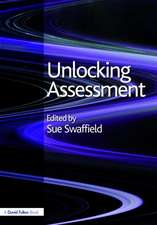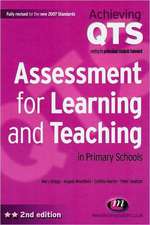Research on PISA: Research Outcomes of the PISA Research Conference 2009
Editat de Manfred Prenzel, Mareike Kobarg, Katrin Schöps, Silke Rönnebecken Limba Engleză Paperback – 15 oct 2014
| Toate formatele și edițiile | Preț | Express |
|---|---|---|
| Paperback (1) | 556.09 lei 38-44 zile | |
| SPRINGER NETHERLANDS – 15 oct 2014 | 556.09 lei 38-44 zile | |
| Hardback (1) | 567.05 lei 38-44 zile | |
| SPRINGER NETHERLANDS – 17 sep 2012 | 567.05 lei 38-44 zile |
Preț: 556.09 lei
Preț vechi: 695.11 lei
-20% Nou
Puncte Express: 834
Preț estimativ în valută:
106.42€ • 110.47$ • 88.74£
106.42€ • 110.47$ • 88.74£
Carte tipărită la comandă
Livrare economică 18-24 martie
Preluare comenzi: 021 569.72.76
Specificații
ISBN-13: 9789401780551
ISBN-10: 9401780552
Pagini: 244
Ilustrații: XXII, 222 p.
Dimensiuni: 155 x 235 x 15 mm
Greutate: 0.35 kg
Ediția:2013
Editura: SPRINGER NETHERLANDS
Colecția Springer
Locul publicării:Dordrecht, Netherlands
ISBN-10: 9401780552
Pagini: 244
Ilustrații: XXII, 222 p.
Dimensiuni: 155 x 235 x 15 mm
Greutate: 0.35 kg
Ediția:2013
Editura: SPRINGER NETHERLANDS
Colecția Springer
Locul publicării:Dordrecht, Netherlands
Public țintă
ResearchCuprins
Introduction: Research on PISA, with PISA, and for PISA: Manfred Prenzel.- Part I – Content Related Research.- Introduction: Werner Blum.- 1. Implications of PISA Outcomes for Science Curriculum Re-form in the Netherlands: Harrie Eijkelhof, Johanna Kordes & Elwin Savelsbergh.- 2. Using Mathematical Competencies to Predict Item Difficulty in PISA: A MEG Study: Ross Turner, John Dossey, Werner Blum & Mogens Niss.- 3. PISA Mathematics in Germany: Extending the Conceptual Framework to Enable a More Differentiated Assessment: Michael Neubrand.- Part II – Methodological research.- Introduction: Methodological Research in Large-Scale Inter-national Assessments: The case of PISA: Mark Wilson.- 4. Modeling Reciprocal determinism in PISA: Trevor Williams & Kitty Williams.- 5. The Measurement of Translation Error in PISA-2006 Items: An Application of the Theory of Test Translation Error: Guillermo Solano-Flores, Luis Ángel Contreras-Niño & Eduardo Backhoff.- 6. PISA Student Nonresponse Adjustment Procedures: Keith Rust, Sheila Krawchuk & Christian Monseur.- 7. Reporting Differentiated Literacy Results in PISA by using Multidimensional Adaptive Testing: Andreas Frey, Nicki-Nils Seitz & Ulf Kroehne.- Part III – Context Related Research.- Introduction: Context Related Research on PISA: Eckhard Klieme.- 8. More Hours Do Not Necessarily Pay Off. The Effect of Learning Time on Student Performance at Different School Types in Switzerland: Domenico Angelone & Urs Moser.- 9. The Anatomy of Inequalities in Educational Achievements: An International Investigation Using PISA data: Tarek Mostafa.- Part IV – Research on Trends in PISA.- Introduction: What are trends and why are they important for PISA?: Matthias von Davier.- 10. An Investigation of Australian OECD PISA Trend Results: Daniel Urbach.- 11. Success Despite the Odds? Outcomes for Low-performing Students in Australia:Sue Thomson & Kylie Hillman.- 12. Linking PISA Competencies over Three Cycles – Results from Germany?: Claus H. Carstensen.
Notă biografică
Manfred Prenzel is Professor of Empirical Educational Research (Susanne Klatten Endowed Chair) and Dean of the TUM School of Education (Technische Universitaet Muenchen, Germany). He has been a member of the OECD Science Expert Group since the first PISA survey in 2000. As the national project manager for PISA 2003, 2006 and 2012, he supplemented the international surveys in Germany with additional samples and assessments that provided data on the broader range of conditions of teaching and learning on the school and classroom level. Manfred Prenzel is also Director of the German Center for International Large Scale Assessment (ZIB) at TU Muenchen.
Mareike Kobarg is a research fellow at the Leibniz-Institute for Science and Mathematics Education (IPN, Kiel, Germany). Her research focuses on science teaching and learning mainly using video based methods. She has currently published further analysis concerning the international Comparison of Science Teaching and Learning in the OECD countries.
Katrin Schöps is a researcher at the Leibniz-Institute for Science and Mathematics Education (IPN, Kiel, Germany). She holds a PhD in Ecology and an MSc in Biology. Her research focuses on the development and assessment of science competencies across the life span with an emphasis on large scale assessments.
Silke Rönnebeck has a Ph.D. in natural sciences and works as a research fellow at the Leibniz-Institute for Science and Mathematics Education (IPN, Kiel, Germany). She was part of the national coordination team of PISA 2006 in Germany. Her research focuses on the development and assessment of science competencies and the improvement of pre-service and in-service science teacher education based on methods of IBST.
Mareike Kobarg is a research fellow at the Leibniz-Institute for Science and Mathematics Education (IPN, Kiel, Germany). Her research focuses on science teaching and learning mainly using video based methods. She has currently published further analysis concerning the international Comparison of Science Teaching and Learning in the OECD countries.
Katrin Schöps is a researcher at the Leibniz-Institute for Science and Mathematics Education (IPN, Kiel, Germany). She holds a PhD in Ecology and an MSc in Biology. Her research focuses on the development and assessment of science competencies across the life span with an emphasis on large scale assessments.
Silke Rönnebeck has a Ph.D. in natural sciences and works as a research fellow at the Leibniz-Institute for Science and Mathematics Education (IPN, Kiel, Germany). She was part of the national coordination team of PISA 2006 in Germany. Her research focuses on the development and assessment of science competencies and the improvement of pre-service and in-service science teacher education based on methods of IBST.
Textul de pe ultima copertă
The Programme for International Student Assessment (PISA) is an important part of the OECD's Indicator Programme. It collects data and provides comparative indicators of education systems in OECD member and partner countries. PISA provides datasets of outstanding quality regarding samples, instruments and analyses. In addition to its important function for educational monitoring, the PISA datasets are the basis of a wide range of secondary analyses from a number of different scientific perspectives and disciplines. The aim of this book is to make some of the outstanding PISA related research results available for a wider audience. Specifically four research areas will be focused: (1) Content related research; (2) Methodological research; (3) Context related research; (4) Research on trends in PISA. Each part of the book is devoted to one of these areas and will start with an introduction from a leading expert in the field followed by chapters covering research conducted in this field.
Caracteristici
First publication specifically focusing on research related to PISA Unique contributions on PISA research by leading experts from interdisciplinary fields Provides insight into different areas of comparative research on a large international scale










